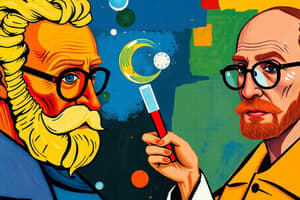Podcast
Questions and Answers
What led to Pluto being demoted from a full-sized planet to a dwarf planet in August 2006?
What led to Pluto being demoted from a full-sized planet to a dwarf planet in August 2006?
- It lacked a moon in its orbit.
- It was discovered to be made of different materials than other planets.
- It was too small to be considered a planet.
- It did not meet all criteria for a full-sized planet. (correct)
According to the Royal Society, what is integral to the scientific method?
According to the Royal Society, what is integral to the scientific method?
- Blindly accepting all information.
- Questioning established facts. (correct)
- Avoiding experimentation.
- Relying solely on theoretical models.
What historical examples demonstrate how scientific hypotheses can evolve with new discoveries and advancements?
What historical examples demonstrate how scientific hypotheses can evolve with new discoveries and advancements?
- Einstein's theory of general relativity and Galileo's observations with the telescope.
- Sir Francis Bacon's observation of symmetrical coastlines and Robert Plot's mistaken identification of a fossilized bone. (correct)
- Marie Curie's work on radioactivity and Mendel's genetics experiments.
- Darwin's theory of evolution and Newton's laws of motion.
When was Einstein's theory of general relativity confirmed?
When was Einstein's theory of general relativity confirmed?
Why is uncertainty in science considered necessary for progress?
Why is uncertainty in science considered necessary for progress?
What did the International Astronomical Union declare about Pluto in August 2006?
What did the International Astronomical Union declare about Pluto in August 2006?
Flashcards are hidden until you start studying
Study Notes
- Pluto was demoted from a full-sized planet to a dwarf planet in August 2006 by the International Astronomical Union due to not meeting all criteria for a full-sized planet.
- The Royal Society emphasizes that questioning established facts is integral to the scientific method, which involves a system of checks and balances based on raw information from experiments and observations of nature.
- Historical examples like Sir Francis Bacon's observation of symmetrical coastlines and Robert Plot's mistaken identification of a fossilized bone highlight how scientific hypotheses can evolve with new discoveries and advancements.
- The scientific method involves setting up groundbreaking experiments at the right time and place to test theories, as seen with the confirmation of Einstein's theory of general relativity in 1919 after a solar eclipse provided the perfect conditions.
- Uncertainty in science is necessary for progress, as diversity in perspectives and openness to being proved wrong lead to the replacement of outdated ideas with new information, ultimately driving scientific advancements.
Studying That Suits You
Use AI to generate personalized quizzes and flashcards to suit your learning preferences.




